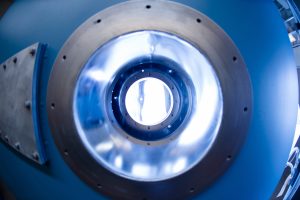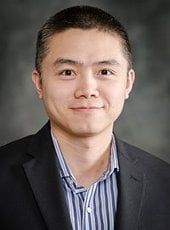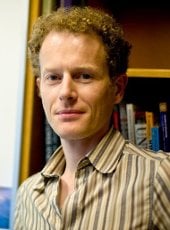Miguel Levy (Physics/MSE) and Dolendra Karki (Physics) authored a paper published this month in Scientific Reports — Nature, entitled “Nonreciprocal Transverse Photonic Spin and Magnetization-Induced Electromagnetic Spin-Orbit Coupling.”
Miguel Levy (Physics/MSE) and Dolendra Karki (Physics) authored a paper published this month in Scientific Reports — Nature, entitled “Nonreciprocal Transverse Photonic Spin and Magnetization-Induced Electromagnetic Spin-Orbit Coupling.”
Will Cantrell, coordinator of the Summer Undergraduate Research Fellowship program, will conduct a workshop for students on the SURF application process, including writing an effective SURF proposal. The workshop will take place at 6 p.m. tomorrow (Jan. 12) in Fisher 130.
Faculty and staff are encouraged to notify students interested in applying for SURF funding to attend. This workshop will cover the same material as the one presented in December.
The deadline for SURF applications is 4 p.m. Jan. 27.
Raymond Shaw (Physics/EPSSI) is the principal investigator on a project that has received a $98,855 research and development contract from the Pacific Northwest National Laboratory.
The project is titled “HOLODEC Participation in the ARM Campaign Aerosol and Cloud Experiments in the Eastern North Atlantic (ACE-ENA).”
This is a 20-month project.
In Mineralogical Magazine’s recent newsletter, the International Commission on New Minerals, Nomenclature and Classification announced twelve new minerals that were approved by the commission in November.
Among them is a new bismuth and gold sulfide [Bi3S3][AuS2] from Alsó-Rózsa adit, Nagybörzsöny Mountains, Pest Co., Hungary named jaszczakite, in honor of Michigan Tech professor John Jaszczak (Physics).
The new mineral was proposed by Luca Bindi (Università di Firenze, Italy;) and Werner Paar (Salzburg, Austria).
Crain’s Detroit Business published three articles about Michigan Tech-based technologies that are being commercialized for the marketplace.
One is about StabiLux Biosciences, based on Yoke Khin Yap’s (Physics) research. Another describes MicroDevice Engineering, producing a battery-operated portable blood typing device developed by Adrienne Minerick (ChE, Associate Dean for Research and Innovation), and the third is about Neuvokas, a local manufacturer of fiber-reinforced polymer rebar developed by Tech alumni and tested at the University.

There are few absolutes in life, but Will Cantrell says this is one: “Every cloud droplet in Earth’s atmosphere formed on a preexisting aerosol particle.”
And the way those droplets form — with scarce or plentiful aerosol particles — could have serious implications for weather and climate change.
It’s been known for decades that cleaner clouds tend to have bigger cloud droplets. But through research conducted in Michigan Tech’s cloud chamber, which was published by Proceedings of the National Academy of Sciences, Cantrell, graduate student Kamal Kant Chandrakar, Raymond Shaw and colleagues found that cleaner clouds also have a much wider variability in droplet size. So wide, in fact, that some are large enough to be considered drizzle drops.
Dirtier clouds, Shaw explains, not only have smaller droplets, but also much more uniformity in droplet size, with no observable drizzle drops.
“If clouds have more aerosols in them, the drops would be smaller and more similar in size,” Shaw says. “It would be harder for the cloud to rain, and the cloud would then last longer. If a cloud rains, or has less water in it, it won’t be there to reflect sunlight.”
By Stefanie Sidortsova, read the full story.
 Pengfei Xue (CEE) and his modeling work through the Great Lakes Research Center, which led to a more comprehensive climate and hydrodynamics model for the whole Great Lakes region, has been featured in several science media outlets including Science Daily, Phys.org, Terra Daily and Supercomputing Online News. The story was shared numerous times by collaborators and the science community on Twitter.
Pengfei Xue (CEE) and his modeling work through the Great Lakes Research Center, which led to a more comprehensive climate and hydrodynamics model for the whole Great Lakes region, has been featured in several science media outlets including Science Daily, Phys.org, Terra Daily and Supercomputing Online News. The story was shared numerous times by collaborators and the science community on Twitter.
The collaborative work brought together researchers from Michigan Technological University, Loyola Marymount University, LimnoTech and the National Oceanic and Atmospheric Administration’s Great Lakes Environmental Research Laboratory. Pengfei Xue, an assistant professor of civil and environmental engineering at Michigan Tech, led the study through his work at the Great Lakes Research Center on campus.
One of the important concepts in climate change, in addition to knowing the warming trend, is understanding that extreme events become more severe. That is both a challenge and an important focus in regional climate modeling. —Pengfei Xue
 Dozens of news outlets and science blogs have covered research by John Jaszczak (Physics) and his team that led to the discovery of the new mineral merelaniite.
Dozens of news outlets and science blogs have covered research by John Jaszczak (Physics) and his team that led to the discovery of the new mineral merelaniite.
Several of the outlets include United Press International, Australian Mining, Phys.org, the German blog Scinexx, several geology blogs like Geology In and Science Explorer. Local coverage in Tanzania has also been extensive including stories by the BBC and The Guardian in Swahili.
News outlets around the world cove ring the Mosul, Iraq fires quoted Simon Carn (GMES and Atmospheric Sciences) for his work in sulfur dioxide emissions.
ring the Mosul, Iraq fires quoted Simon Carn (GMES and Atmospheric Sciences) for his work in sulfur dioxide emissions.
The original story was posted by NASA’s Earth Observatory along with satellite images; news outlets include ABC News, Nature World News, Yahoo News and a number of science blogs.
Raymond Shaw (Physics/EPSSI) is the principal investigator on a research and development project that has received a $150,931 grant from the U.S. Department of Defense, Air Force Research Laboratory (AFRL).
Will Cantrell (Physics) and Claudio Mazzoleni (Physics) are Co-PIs on the project, “An Investigation of the Suitability of a Laboratory Cloud Chamber for Optical Radiative Transfer Measurements.”
This is the first year of a two-year project potentially totaling $316,374.